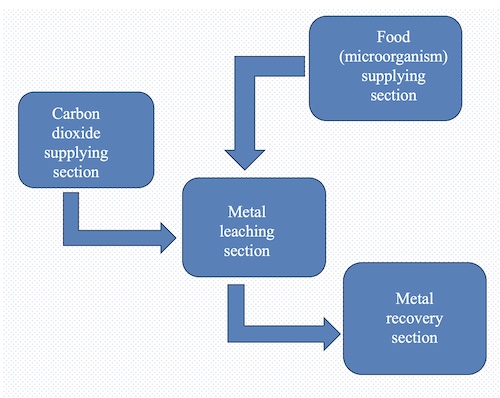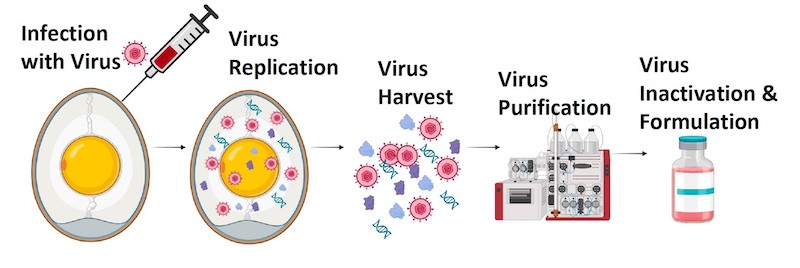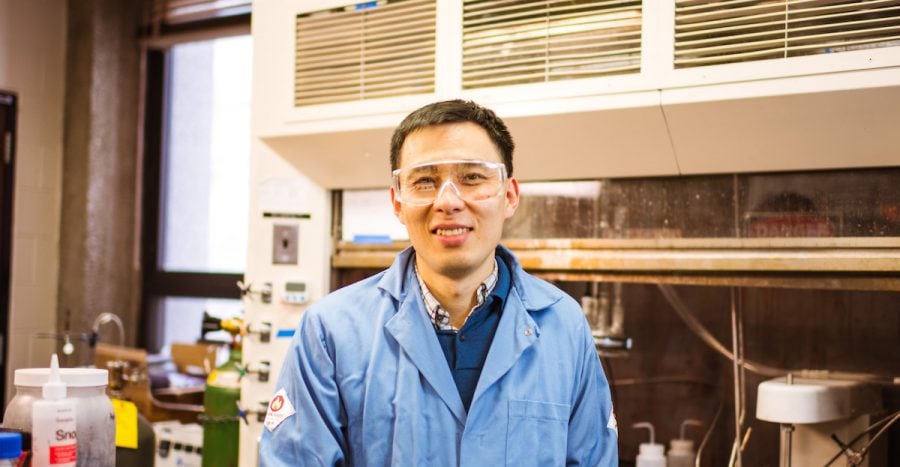The Graduate School announced Michigan Tech’s Summer 2025 Finishing Fellows. Please congratulate Chemical Engineering student Grace Dykstra on this amazing accomplishment!
The Vice President for Research Office announced the Spring 2025 Research Excellence Fund (REF) award recipients. Congratulations to Daniel Kulas, Research Associate Professor in Chemical Engineering, the principal investigator for a project that won a Research Seed Grant!
The Graduate School announced Michigan Tech’s Summer 2025 Finishing Fellows. Please congratulate Chemical Engineering student Palas Kamlakar Borkar on this accomplishment.
Michigan Tech research crosses disciplines — and crosses the globe. “International partnerships are really key to expanding your research network, research ideas, and to be able to have your research out into industry and be applied,” said Professor Caryn Heldt (ChE), who directs the University’s Health Research Institute.
In the Heldt Bioseparations Laboratory, research team members are collaborating to apply their work in ways that can be adapted for best use in countries throughout the world. Bellicia Kamwanya, a research biologist in the Democratic Republic of Congo, teamed up with award-winning MTU researcher Vaishali Sharma in Heldt’s lab as part of the U.S.-Africa Frontiers fellowship program.
Hear from Kamwanya in a video on the College of Engineering Blog.
Lei Pan (ChE) and Tinuade Ololade Folayan ’20 ’23 (M.S. Ph.D. Chemical Engineering) were mentioned by Argonne National Laboratory in a release announcing a new froth flotation method of separating individual cathode materials from spent lithium-ion batteries.
Robert Handler (ChE/GLRC), the principal investigator on a project, received a $262,537 research and development co-op joint agreement from the U.S. Department of Agriculture, U.S. Forest Service.
The project is titled “Evaluating the Sustainable Production of Engineered BioCarbon for Coal Combustion Residual (CCR) Remediation from Fuel Reduction Treatments in the Superior National Forest (SNF).”
This is a potential three-year project.
Chemical Engineering faculty member Lei Pan’s research on battery recycling and improving the sustainability of mining through the recovery of critical minerals continues to draw regional and national interest.
Pan was recently quoted in a Bridge Michigan article, “Michigan’s electric energy future could be wasting away in a junk drawer,” which focused on the impact that recycling old electronic devices could have on the critical mineral shortage. The article described critical mineral shortage as a “looming choke point” affecting the nation’s energy transition and Michigan’s electric vehicle industry.
The article also noted that Pan’s lab will expand its research through the opening of a testing facility in summer 2025 through $8.1 million awarded to Michigan Tech through the federal Infrastructure Investment and Jobs Act.
Lei Pan (ChE) was quoted by Interlochen Public Radio in a story about the Department of Environment, Great Lakes, and Energy’s (EGLE) Critical Minerals Recycling Grant Program. The program will offer $4.75 million in matching grants for research projects focused on recycling critical minerals found in electric vehicle batteries and other technologies.
Pan was part of a team that partnered with Eagle Mine in the Upper Peninsula and was awarded a total of $10.6 million in federal dollars to research domestic battery recycling and reprocessing mine tailings.
“We’re definitely looking forward to new ideas and new innovation. Making sure that the battery recycling industry will become more sustainable in the future, and become more profitable.”
The EGLE Recycling Unit grant is to advance the research, development, or demonstration of concepts or projects intended to create innovative and practical approaches to increase the reuse and recycling of batteries and other critical minerals.
Pan’s research interests include particulate separation, surface chemistry, and process modeling.
Natalie Nold Takes First Place for Oral Presentation
Nold’s presentation was entitled “A Versatile Purification Method for Virus-based Gene Therapy.”
Presentation Extract
- The costly manufacturing methods used for viral vectors are a key reason why gene therapies can be prohibitively expensive, often costing over $1 million per patient treated.
- Our lab has developed a continuous purification method using aqueous two-phase systems (ATPS), which combines product capture and purification by partitioning the viral product and contaminating host-cell impurities to different aqueous phases.
- ATPS holds promise as a viral vector purification platform with 66-100% overall product recovery for adeno-associated virus (AAV), herpes simplex virus (HSV), porcine parvovirus (PPV), and influenza B virus.
Graduate Research Colloquium 2024
Date: March 26, 2024
Time: 8 a.m.—9 p.m.
Location: Rozsa Center, MTU
March 26 (9 a.m.–3 p.m.) – Oral Presentations (MUB Alumni Lounge)
March 26 (5–8 p.m.) – Poster Presentations (Rosza Lobby)
Chemical Engineering at the Graduate Research Colloquium
Please attend the poster sessions to learn more from the graduate student presenters.

Sustainable Nickel Recovery from Ore and Mine Tailings Using CO2 and Microorganisms
Kwabena Boafo, Timothy C. Eisele
Abstract
- As the demand for nickel increases in EV batteries and steel manufacturing, the depletion of high-grade nickel ore prompts the mining industry to process low-grade nickel ore, resulting in the generation of significant mine waste, known as tailings.
- Despite the tailings containing valuable minerals and metals most times high metal content compared with original ore, they pose environmental and health risks.
- There is a growing interest in exploring methods to extract the valuable minerals and metals from the tailings.
- This study proposes a sustainable approach to extract nickel from ores and tailings, utilizing CO2 and microorganisms.
- Operating at freezing temperatures, bicarbonate ions are formed that effectively complex with nickel.

Aqueous Two-Phase Systems for Influenza Viral Vaccine Purification: A Promising Alternative
Taravat Sarvari, Elizaveta Korolkov, Natalie Nold, Lynn Manchester, and Caryn L. Heldt
Background and Motivation
Viral vaccine production is currently performed in batch mode.
Current Influenza vaccine production in eggs is antiquated, slow, and cannot produce a new strain of vaccine quickly.
Goal: Develop a platform for continuous purification of Influenza virus using aqueous two-phase systems (ATPS).
Prof. Pan in the Department of Chemical Engineering at Michigan Technological University is recruiting at least two PhD students in Fall 2024. These two positions will be fully funded through research grants/contracts for at least 3 years. The stipend for year 1 will be $24,000 (also subjected to inflation adjustment), and 100% tuition support ($27,702) will be provided to the candidate. In year 3, the stipend will raise to ~$30,000 at least.
The ideal candidates will be from engineering departments with some chemical processing, material characterization, mineral processing, and extractive metallurgy background. The team is particularly looking for candidates with a strong motivation to pursue their career in R&D or academia (professorship) in the field of chemical processing of critical minerals/materials, industrial decarbonation, and circular economy. PhD candidates are expected to submit their work to the top journals and present their work at both national and international conferences. Basic wet lab experience and good knowledge in general chemistry are the perquisite for the candidates.
PhD graduates and postdoc fellows from our team are working in the top-tier companies and universities in the field of chemical processing, mineral processing, and electronics processing. Their starting salary after PhD is in the range of $120K–$210K. Majority of PhD candidates will be able to finish their degrees within 4–5 years. Few of them finish their degree in 3.5 years. Other benefits from our team include 1) one paid trip to major conference in year 1–2 and two paid trip to major conferences in year 3-5, 2) annual 1.5–week winter leave and 2-week summer leave, 3) various professional development opportunities including some entrepreneurship trainings.
- The PhD candidate #1 will be working on chemical processing of lithium-containing resources. This candidate will be working on developing technologies in producing lithium chemicals from both primary and secondary resources and understanding the mechanisms for the process and unit operation used and developed by this candidate.
- The PhD candidate #2 will be working on developing industrial decarbonation solutions using the mineral carbonation technology. The candidate will be developing passive mineral carbonation technology and carbon quantification technology, as well as in-situ mineral carbonation.
- The PhD candidate #3 (still to be finalized) will be involved in developing circular economy solutions for electric vehicle (EV) Li-ion battery packs. This candidate will be working on developing technical solutions to dissemble and recover various materials from EV packs. Interest and expertise in mechanics and power electronics may be required.
If you have any questions and interest in joining us, please contact Dr. Pan at leipan@mtu.edu asap.
